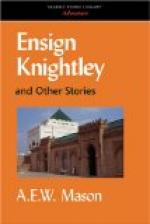Julian prepared the tea, and talked while he prepared it. “It is this way,” he began quietly. “You know what I have always believed; that the will was the man, his soul, his life, everything. Well, in the old days thoughts and ideas commenced to make themselves felt in me, to crop up in my work. I would start on a picture with a clear settled design; when it was finished, I would notice that by some unconscious freak I had introduced a figure, an arabesque, always something which made the whole incongruous and bizarre. I discovered the cause during the week after I received your last letter. The thoughts, the ideas were yours; better than mine perhaps, but none the less death to me.”
Lady Tamworth stirred uneasily under a sense of guilt, and murmured a faint objection. Julian shook off the occupation of his theme and handed her some cake, and began again, standing over her with the cake in his hand, and to all seeming unconscious that there was a strain of cruelty in his words. “I found out what that meant. My emotions were mastering me, drowning the will in me. You see, I cared for you so much—then.”
A frank contempt stressing the last word cut into his hearer with the keenness of a knife. “You are unkind,” she said weakly.
“There’s no reproach to you. I have got over it long ago,” he replied cheerily. “And you showed me how to get over it; that’s why I am grateful. For I began to wonder after that, why I, who had always been on my guard against the emotions, should become so thoroughly their slave. And at last I found out the reason; it was the work I was doing.”
“Your work?” she exclaimed.
“Exactly! You remember what Plato remarked about the actor?”
“How should I?” asked poor Lady Tamworth.
“Well, he wouldn’t have him in his ideal State because acting develops the emotions, the shifty unstable part of a man. But that’s true of art as well; to do good work in art you must feel your work as an emotion. So I cut myself clear from it all. I furnished these rooms and came down here,—to live.” And Julian drew a long breath, like a man escaped from danger.




